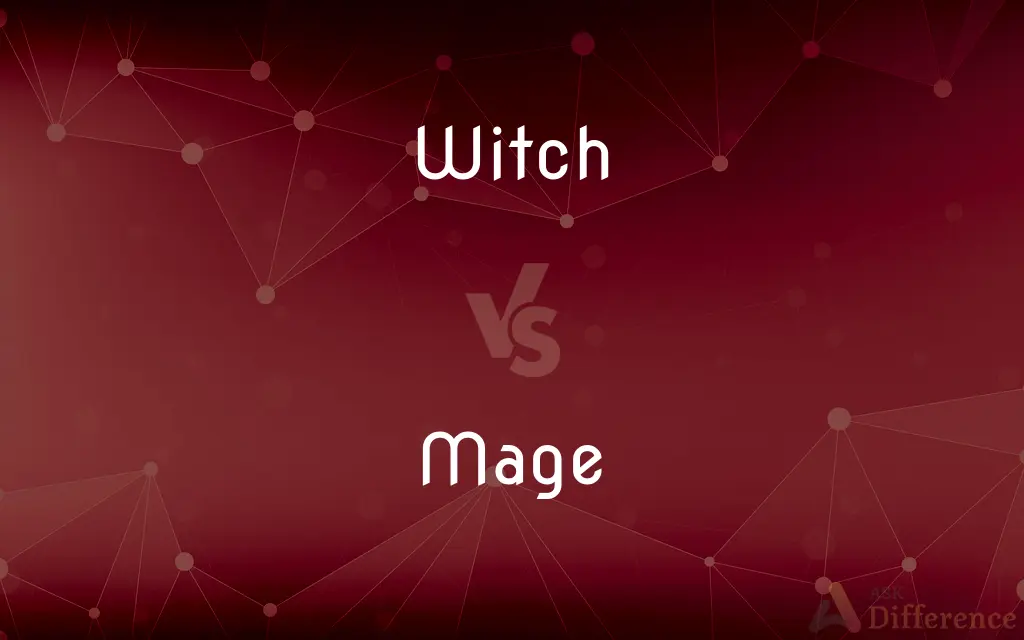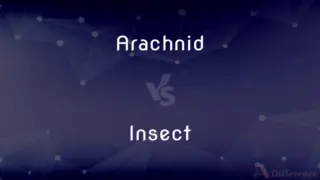Witch vs. Mage — What's the Difference?
By Tayyaba Rehman — Updated on October 3, 2023
A witch is often associated with folklore, practicing magic and sometimes malevolence, while a mage is a general term for a practitioner of magic, often with scholarly connotations.

Difference Between Witch and Mage
Table of Contents
ADVERTISEMENT
Key Differences
Witch and mage are both terms that refer to individuals with magical abilities, but their origins and implications vary. A witch, historically, has ties to European folklore and is often depicted as a woman with supernatural powers, sometimes aligned with dark forces. On the contrary, the term mage can be traced back to ancient civilizations, with mages being considered scholars and wise people knowledgeable in the arcane arts. In popular culture, witches are sometimes shown as individuals practicing herbology, spell-casting, and potion-making, and they might be tied to nature or ancient traditions. Mages, however, might be depicted as studying ancient tomes, casting complex spells, or involved in high-level magical research. Another distinction can be the societal perception; witches have been, at times, feared or persecuted, as seen in the witch hunts. Mages, conversely, are often seen as respected or revered figures, akin to wise men or advisors. Both terms, while pointing to magical prowess, have their nuances and cultural baggage, making them distinct in their own right.
Comparison Chart
Origin
European folklore.
Ancient civilizations.
Gender Association
Historically female-dominated.
Generally gender-neutral.
Societal Perception
Sometimes feared or persecuted.
Often revered or respected.
Magical Practices
Herbology, spell-casting, potion-making.
Ancient tomes, high-level magic.
ADVERTISEMENT
Connection
Nature, ancient traditions.
Scholarship, arcane studies.
Compare with Definitions
Witch
A witch is a person, especially a woman, who practices magic.
The village feared the old witch living in the woods.
Mage
A mage is an individual skilled in magic.
The mage cast a spell to protect the city.
Witch
Historically, "witch" has been used to accuse someone of malevolent magic.
During the Salem trials, many were falsely accused of being a witch.
Mage
Mages are generally seen as neutral or benevolent.
The villagers sought the mage's advice during the crisis.
Witch
A person, especially a woman, claiming or popularly believed to possess magical powers and practice sorcery.
Mage
Mage often carries scholarly or wise connotations.
The mage spent years studying ancient texts.
Witch
A believer or follower of Wicca; a Wiccan.
Mage
Mage is a broad term, encompassing various magical practitioners.
Whether a sorcerer, wizard, or scholar, he was a respected mage.
Witch
(Offensive) An old woman considered to be ugly or frightening.
Mage
In some contexts, mages are high-ranking or elite magic users.
As a grand mage, he presided over the magical council.
Witch
A woman considered to be spiteful or overbearing.
Mage
A magician or learned person.
Witch
(Informal) A woman or girl considered to be charming or fascinating.
Mage
A magician or sorcerer.
Witch
One particularly skilled or competent at one's craft
"A witch of a writer, [she] is capable of developing an intensity that verges on ferocity" (Peter S. Prescott).
Mage
A magician, wizard or sorcerer.
Witch
To work or cast a spell on; bewitch.
Mage
(obsolete) magus: a Zoroastrian priest.
Witch
To cause, bring, or effect by witchcraft.
Mage
A magician.
Witch
To use a divining rod to find underground water or minerals; dowse.
Witch
A person who practices witchcraft.
Witch
(now usually particularly) A woman who is learned in and actively practices witchcraft.
Witch
An ugly or unpleasant woman.
I hate that old witch.
Witch
One who exercises more-than-common power of attraction; a charming or bewitching person.
Witch
One given to mischief, especially a woman or child.
Witch
(geometry) A certain curve of the third order, described by Maria Agnesi under the name versiera.
Witch
The storm petrel.
Witch
Any of a number of flatfish:
Witch
Glyptocephalus cynoglossus (Torbay sole), found in the North Atlantic.
Witch
Lepidorhombus whiffiagonis (megrim), found in the North Atlantic.
Witch
Arnoglossus scapha, found near New Zealand.
Witch
The Indomalayan butterfly Araotes lapithis, of the family Lycaenidae.
Witch
A cone of paper which is placed in a vessel of lard or other fat and used as a taper.
Witch
(intransitive) To dowse for water.
Witch
To practise witchcraft.
Witch
(transitive) To bewitch.
Witch
A cone of paper which is placed in a vessel of lard or other fat, and used as a taper.
Witch
One who practices the black art, or magic; one regarded as possessing supernatural or magical power by compact with an evil spirit, esp. with the Devil; a sorcerer or sorceress; - now applied chiefly or only to women, but formerly used of men as well.
There was a man in that city whose name was Simon, a witch.
He can not abide the old woman of Brentford; he swears she's a witch.
Witch
An ugly old woman; a hag.
Witch
One who exercises more than common power of attraction; a charming or bewitching person; also, one given to mischief; - said especially of a woman or child.
Witch
A certain curve of the third order, described by Maria Agnesi under the name versiera.
Witch
The stormy petrel.
Witch
A Wiccan; an adherent or practitioner of Wicca, a religion which in different forms may be paganistic and nature-oriented, or ditheistic. The term witch applies to both male and female adherents in this sense.
Witch
To bewitch; to fascinate; to enchant.
[I 'll] witch sweet ladies with my words and looks.
Whether within us or withoutThe spell of this illusion beThat witches us to hear and see.
Witch
A female sorcerer or magician
Witch
A being (usually female) imagined to have special powers derived from the devil
Witch
An ugly evil-looking old woman
Witch
Cast a spell over someone or something; put a hex on someone or something
Witch
A witch can be someone connected to nature-based spirituality.
The witch used herbs in her healing rituals.
Witch
In a derogatory sense, a witch can refer to an unpleasant woman.
He rudely called his critic a witch.
Witch
Witches are often associated with folklore and superstitions.
Tales of witches flying on broomsticks are popular Halloween stories.
Common Curiosities
Are mages considered scholars?
Often, mages are portrayed as scholarly, studying magic and arcane arts.
Are witches always female?
While historically and in folklore witches are often female, in modern contexts and fiction, male witches exist.
Do both witch and mage refer to people with magical abilities?
Yes, both terms refer to individuals with magical capabilities, but their implications differ.
Do witches have a connection to nature?
In many traditions and stories, witches have strong ties to nature and its elements.
Can mage be used for both men and women?
Yes, the term mage is generally gender-neutral.
Were witches always perceived negatively in history?
Witches have faced persecution, but they've also been revered in certain cultures and periods.
Is a mage's magic always positive?
While mages often carry neutral or benevolent connotations, they can, in some narratives, use magic for ill purposes.
Can witches and mages coexist in the same narrative?
Absolutely, many fictional works feature both witches and mages, each with their roles and characteristics.
Is the term "mage" specific to a culture or region?
Mage has roots in ancient civilizations but has become a broad, almost universal term in fantasy and magic-related contexts.
Can the term "witch" be used in a derogatory manner?
Historically and even now, "witch" can be derogatory, especially when referring to an unpleasant woman.
Are all magic practitioners witches or mages?
No, there are various terms for magic users, including sorcerer, wizard, warlock, and more, each with its nuances.
Can the terms be used interchangeably?
While they both refer to magic users, their connotations and historical baggage make them distinct in many contexts.
How do witchcraft practices differ between witches and mages?
Witches often engage in herbology, spell-casting, and potion-making, while mages might focus on high-level magic or arcane studies.
Are real-world modern witches and mages the same as their folklore counterparts?
Modern practitioners of witchcraft or magic may draw from historical or traditional practices, but they also have contemporary interpretations and beliefs.
How have perceptions of witches and mages evolved over time?
While perceptions have varied by culture and era, modern views, especially influenced by media and literature, have broadened and become more nuanced regarding both witches and mages.
Share Your Discovery

Previous Comparison
Email vs. Mail
Next Comparison
Arachnid vs. InsectAuthor Spotlight
Written by
Tayyaba RehmanTayyaba Rehman is a distinguished writer, currently serving as a primary contributor to askdifference.com. As a researcher in semantics and etymology, Tayyaba's passion for the complexity of languages and their distinctions has found a perfect home on the platform. Tayyaba delves into the intricacies of language, distinguishing between commonly confused words and phrases, thereby providing clarity for readers worldwide.















































